LLN Evaluation Form
Added on 2022-12-26
29 Pages4802 Words1 Views
LLN Evaluation Form
Date of
Assessment
Work Role/Job
Title
Assessed By
Position
Signature
Work Role LLN Requirements
Learning Reading Writing Oral Numerac
y
Work Role Support Level ACSF
Level Comments
Works alongside a
supervisor/mentor where
prompting and advice can be
provided.
1
Works with a supervisor/mentor
who can provide support when
requested.
2
Works independently and uses
own familiar support resources. 3
Works independently and
initiates and uses support from a
range of established resources.
4
Works Autonomously and
accesses and evaluates support
from a broad range of sources.
5
This form was developed from information contained in the ACSF by Compliant Learning Resources
Page 1
Date of
Assessment
Work Role/Job
Title
Assessed By
Position
Signature
Work Role LLN Requirements
Learning Reading Writing Oral Numerac
y
Work Role Support Level ACSF
Level Comments
Works alongside a
supervisor/mentor where
prompting and advice can be
provided.
1
Works with a supervisor/mentor
who can provide support when
requested.
2
Works independently and uses
own familiar support resources. 3
Works independently and
initiates and uses support from a
range of established resources.
4
Works Autonomously and
accesses and evaluates support
from a broad range of sources.
5
This form was developed from information contained in the ACSF by Compliant Learning Resources
Page 1
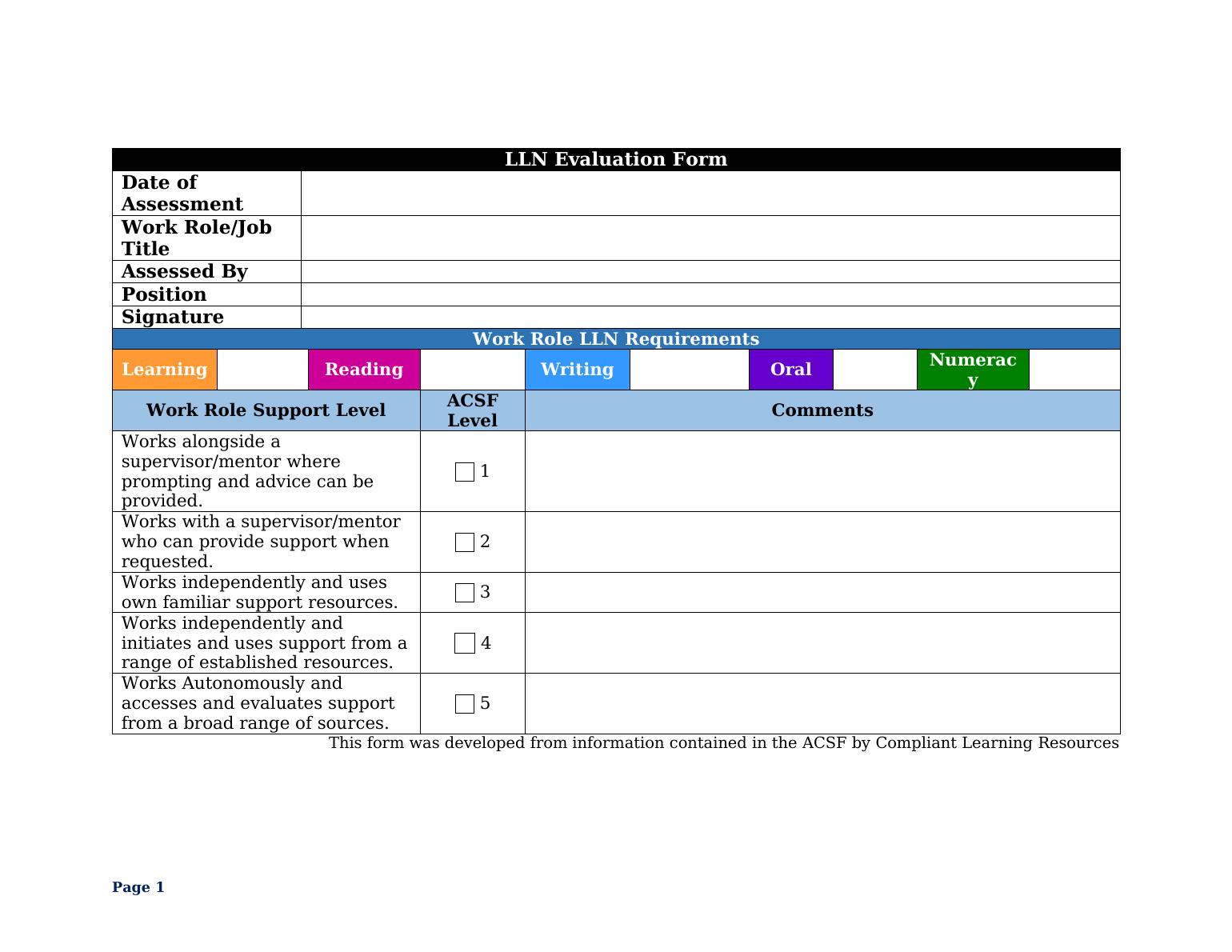
Learning
Context Text Complexity Task Complexity
ACS
F
Level
Comments – Task Details
Highly familiar
contexts
Concrete and
immediate
Very restricted
range of contexts
Short and simple
Highly explicit
purpose
Limited highly
familiar vocabulary
Concrete tasks of 1
or 2 steps
Processes include
locating, recognising
1
Examples
Attends work as required and informs the supervisor if they
are unable to attend
Attends work ready with appropriate clothing, tools and
other resources as required
Context Text Complexity Task Complexity
ACS
F
Level
Comments – Task Details
Familiar and
predictable contexts
Limited range of
context
Simple familiar texts
with clear purpose
Familiar vocabulary
Explicit tasks
involving a limited
number of familiar
steps
Processes include
identifying, simple
interpreting, simple
sequencing
2
Examples
Attempts to take supervisor’s feedback into account when
practising new skills
Page 2
Context Text Complexity Task Complexity
ACS
F
Level
Comments – Task Details
Highly familiar
contexts
Concrete and
immediate
Very restricted
range of contexts
Short and simple
Highly explicit
purpose
Limited highly
familiar vocabulary
Concrete tasks of 1
or 2 steps
Processes include
locating, recognising
1
Examples
Attends work as required and informs the supervisor if they
are unable to attend
Attends work ready with appropriate clothing, tools and
other resources as required
Context Text Complexity Task Complexity
ACS
F
Level
Comments – Task Details
Familiar and
predictable contexts
Limited range of
context
Simple familiar texts
with clear purpose
Familiar vocabulary
Explicit tasks
involving a limited
number of familiar
steps
Processes include
identifying, simple
interpreting, simple
sequencing
2
Examples
Attempts to take supervisor’s feedback into account when
practising new skills
Page 2
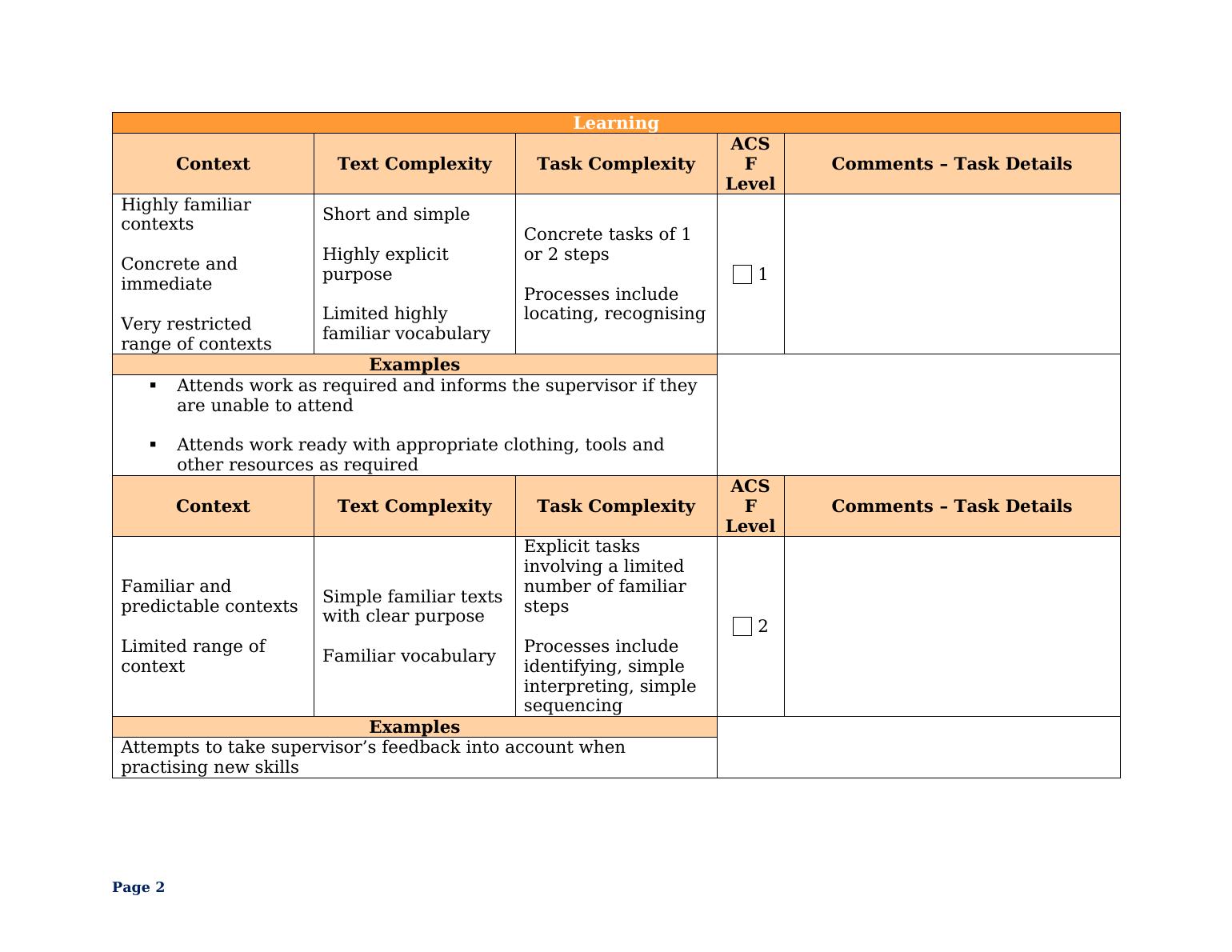
Context Text Complexity Task Complexity
ACS
F
Level
Comments – Task Details
Range of familiar
contexts
Some less familiar
contexts
Some specialisation
in familiar/known
contexts
Routine texts
May include some
unfamiliar elements,
embedded
information and
abstraction
Includes some
specialised
vocabulary
Tasks involve a
number of steps
Processes include
sequencing,
integrating, simple
extrapolating, simple
inferencing, simple
abstracting
3
The training sessions will involve various
tasks. The employees will be required to
review their respective skills regarding food
preparation. This will help in clarifying the
future training sessions. Also, the employees
will be asked to participate in the decision-
making process in order to ensure that they
understand their respective job roles
effectively.
Example
Reviews own skills in relation to job selection criteria to
clarify future study or a training plan
Participates in quality improvement processes in the
workplace, considering the priorities and commitments of
self and other members
Context Text Complexity Task Complexity
ACS
F
Level
Comments – Task Details
Range of contexts,
including some that
are unfamiliar
and/or unpredictable
Some specialisation
in less
familiar/known
contexts
Complex texts
Embedded
information
Includes specialised
vocabulary
Includes abstraction
and symbolism
Complex task
organisation and
analysis involving
application of a
number of steps
Processes include
extracting,
extrapolating,
inferencing,
reflecting,
abstracting
4
The participants will be required to
organize the workplace in order to achieve
a particular outcome or target. Also, they
will have to reflect on their current
performance. They will be trained to use
different equipment that are used for
making different food items.
Example
Page 3
ACS
F
Level
Comments – Task Details
Range of familiar
contexts
Some less familiar
contexts
Some specialisation
in familiar/known
contexts
Routine texts
May include some
unfamiliar elements,
embedded
information and
abstraction
Includes some
specialised
vocabulary
Tasks involve a
number of steps
Processes include
sequencing,
integrating, simple
extrapolating, simple
inferencing, simple
abstracting
3
The training sessions will involve various
tasks. The employees will be required to
review their respective skills regarding food
preparation. This will help in clarifying the
future training sessions. Also, the employees
will be asked to participate in the decision-
making process in order to ensure that they
understand their respective job roles
effectively.
Example
Reviews own skills in relation to job selection criteria to
clarify future study or a training plan
Participates in quality improvement processes in the
workplace, considering the priorities and commitments of
self and other members
Context Text Complexity Task Complexity
ACS
F
Level
Comments – Task Details
Range of contexts,
including some that
are unfamiliar
and/or unpredictable
Some specialisation
in less
familiar/known
contexts
Complex texts
Embedded
information
Includes specialised
vocabulary
Includes abstraction
and symbolism
Complex task
organisation and
analysis involving
application of a
number of steps
Processes include
extracting,
extrapolating,
inferencing,
reflecting,
abstracting
4
The participants will be required to
organize the workplace in order to achieve
a particular outcome or target. Also, they
will have to reflect on their current
performance. They will be trained to use
different equipment that are used for
making different food items.
Example
Page 3
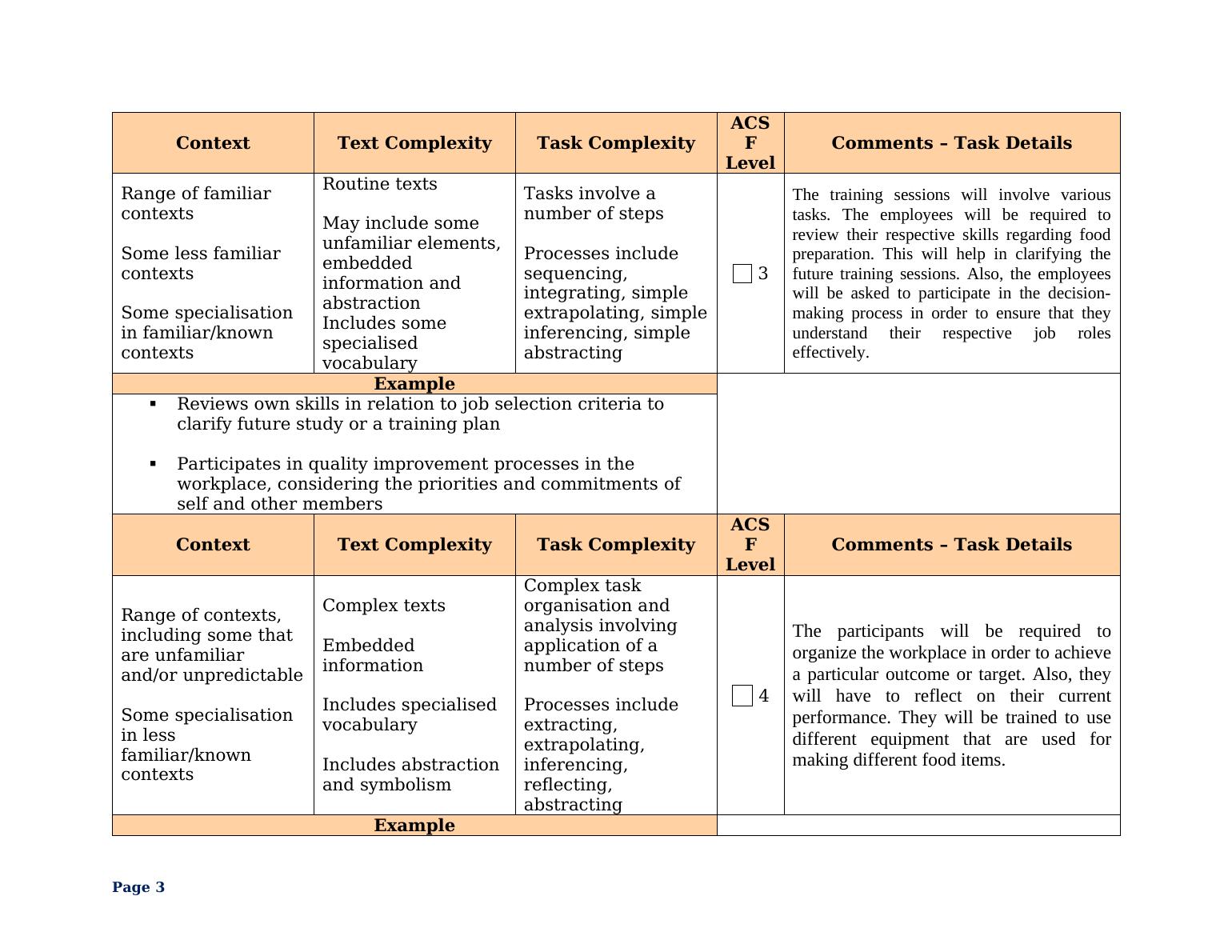
Organises own workplace professional development/training plan
to achieve a negotiated outcome with consideration of personal
priorities and demands on time
Context Text Complexity Task Complexity
ACS
F
Level
Comments – Task Details
Broad range of
contexts
Adaptability within
and across contexts
Specialisation in one
or more contexts
Highly complex texts
Highly embedded
information
Includes highly
specialised language
and symbolism
Sophisticated task
conceptualisation,
organisation and
analysis
Processes include
analysing, reflecting,
synthesising,
evaluating,
recommending
5
The staff members will be asked to participate
in preparing a food item as a team. This will
help them learn about the different skills from
each other. The overall learning culture at the
workplace will also be evaluated. The staff
members will be trained regarding how they
should interact with the customers in order to
gain their loyalty.
Example
Develops a brief for a complex project that includes several
staff with different skills
Evaluates workplace learning culture and pathways in
relation to own need for further training and development
Page 4
to achieve a negotiated outcome with consideration of personal
priorities and demands on time
Context Text Complexity Task Complexity
ACS
F
Level
Comments – Task Details
Broad range of
contexts
Adaptability within
and across contexts
Specialisation in one
or more contexts
Highly complex texts
Highly embedded
information
Includes highly
specialised language
and symbolism
Sophisticated task
conceptualisation,
organisation and
analysis
Processes include
analysing, reflecting,
synthesising,
evaluating,
recommending
5
The staff members will be asked to participate
in preparing a food item as a team. This will
help them learn about the different skills from
each other. The overall learning culture at the
workplace will also be evaluated. The staff
members will be trained regarding how they
should interact with the customers in order to
gain their loyalty.
Example
Develops a brief for a complex project that includes several
staff with different skills
Evaluates workplace learning culture and pathways in
relation to own need for further training and development
Page 4
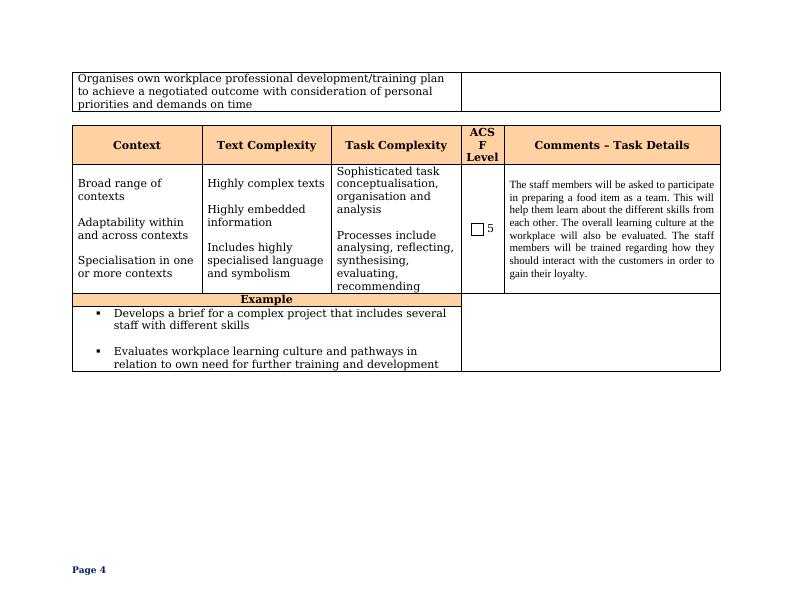
Reading Skills Level
Context Text Complexity Task Complexity
ACS
F
Level
Comments – Task Details
Highly familiar
contexts
Concrete and
immediate
Very restricted
range of contexts
Short and simple,
highly explicit
purpose, limited,
highly familiar
vocabulary
Concrete tasks of 1
or 2 steps. Processes
include locating,
recognising 1
Training will be provided for reading and
understanding the signs as well as
warnings that are used in the kitchen
while preparing food dishes. This will
help them in developing a greater sense of
understanding of the rules as well as
regulations.
Example
Follows simple written or pictorial instructions, e.g. simple signs
and warnings, emergency stop procedures for machines, warnings
such as 'prohibited area' and 'wash hands before entering' or
safety symbols on chemical containers.
Context Text Complexity Task Complexity
ACS
F
Level
Comments – Task Details
Familiar and
predictable contexts
Limited range of
contexts
Simple familiar texts
with clear purpose
Familiar vocabulary
Explicit tasks
involving a limited
number of familiar
steps. Processes
include identifying,
simple interpreting
and sequencing
2
Pictorial instructions will be taught
and the staff members will be asked
to interpret the same. This will help
in improving their reading skills.
Also, their existing vocabulary of
English language will improve.
Example
Interprets instructions which combine pictorial and written
Page 5
Context Text Complexity Task Complexity
ACS
F
Level
Comments – Task Details
Highly familiar
contexts
Concrete and
immediate
Very restricted
range of contexts
Short and simple,
highly explicit
purpose, limited,
highly familiar
vocabulary
Concrete tasks of 1
or 2 steps. Processes
include locating,
recognising 1
Training will be provided for reading and
understanding the signs as well as
warnings that are used in the kitchen
while preparing food dishes. This will
help them in developing a greater sense of
understanding of the rules as well as
regulations.
Example
Follows simple written or pictorial instructions, e.g. simple signs
and warnings, emergency stop procedures for machines, warnings
such as 'prohibited area' and 'wash hands before entering' or
safety symbols on chemical containers.
Context Text Complexity Task Complexity
ACS
F
Level
Comments – Task Details
Familiar and
predictable contexts
Limited range of
contexts
Simple familiar texts
with clear purpose
Familiar vocabulary
Explicit tasks
involving a limited
number of familiar
steps. Processes
include identifying,
simple interpreting
and sequencing
2
Pictorial instructions will be taught
and the staff members will be asked
to interpret the same. This will help
in improving their reading skills.
Also, their existing vocabulary of
English language will improve.
Example
Interprets instructions which combine pictorial and written
Page 5
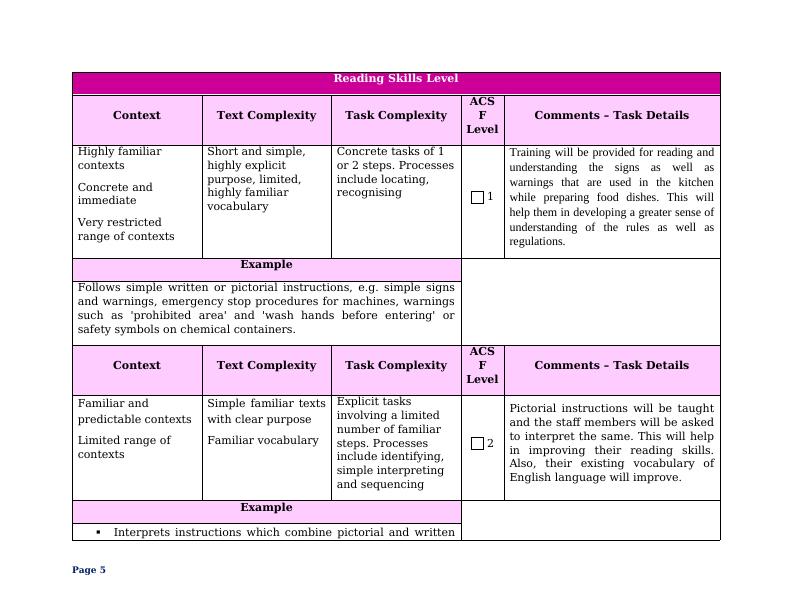
information, e.g. directions on how to operate a piece of
machinery safely or routine step-by-step instructions for
logging into an organisation's computer network.
Reads forms or notices containing personally relevant
information, e.g. a notice at the workplace about a fire drill.
Context Text Complexity Task Complexity
ACS
F
Level
Comments – Task Details
Range of familiar
and some less
familiar contexts
Some specialisation
in familiar/known
contexts
Routine texts. May
include some
unfamiliar elements,
specialised
vocabulary,
embedded
information and
abstraction
Tasks involve
several steps.
Processes include
sequencing,
integrating,
interpreting, simple
extrapolating, simple
inferencing, simple
abstracting
3
Once training regarding reading
pictorial signs and warning is
completed, the staff members will
be trained for interpreting the
information through instant
messages, charts, presentations as
well as other forms of graphics.
Example
Interprets information in a range of formats that has been
produced using familiar software programs, e.g. memos,
instant messages, reports, spreadsheets or data
presentations.
Interprets information gained from tables, charts and other
graphic information using a range of sources, including
brochures, internet and memos, e.g. plans travel
arrangements using a flight schedule.
Page 6
machinery safely or routine step-by-step instructions for
logging into an organisation's computer network.
Reads forms or notices containing personally relevant
information, e.g. a notice at the workplace about a fire drill.
Context Text Complexity Task Complexity
ACS
F
Level
Comments – Task Details
Range of familiar
and some less
familiar contexts
Some specialisation
in familiar/known
contexts
Routine texts. May
include some
unfamiliar elements,
specialised
vocabulary,
embedded
information and
abstraction
Tasks involve
several steps.
Processes include
sequencing,
integrating,
interpreting, simple
extrapolating, simple
inferencing, simple
abstracting
3
Once training regarding reading
pictorial signs and warning is
completed, the staff members will
be trained for interpreting the
information through instant
messages, charts, presentations as
well as other forms of graphics.
Example
Interprets information in a range of formats that has been
produced using familiar software programs, e.g. memos,
instant messages, reports, spreadsheets or data
presentations.
Interprets information gained from tables, charts and other
graphic information using a range of sources, including
brochures, internet and memos, e.g. plans travel
arrangements using a flight schedule.
Page 6
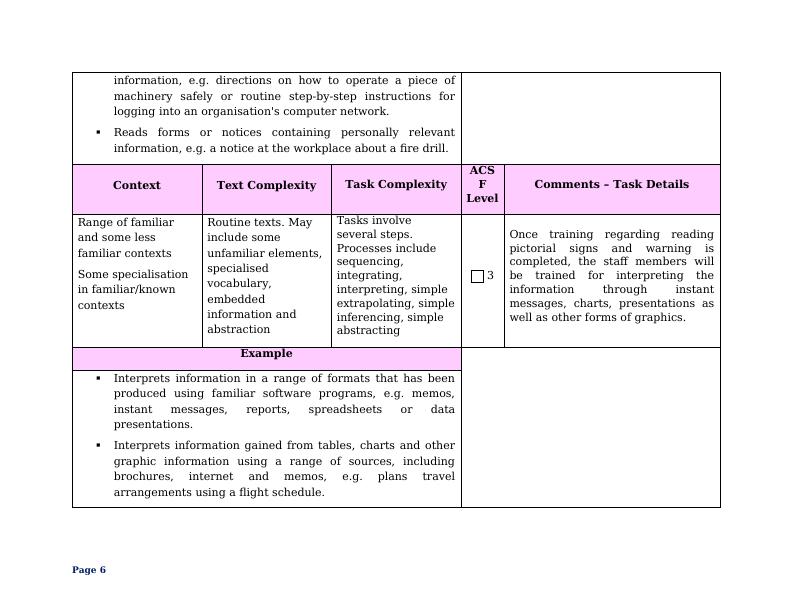
End of preview
Want to access all the pages? Upload your documents or become a member.
Related Documents
Work Role LLN Evaluation Formlg...
|27
|3946
|215
LLN Evaluation Formlg...
|11
|1310
|244
Work Role LLN Evaluation Form for Housekeeping Assistantlg...
|32
|4747
|361
LLN Evaluation Formlg...
|6
|768
|68
